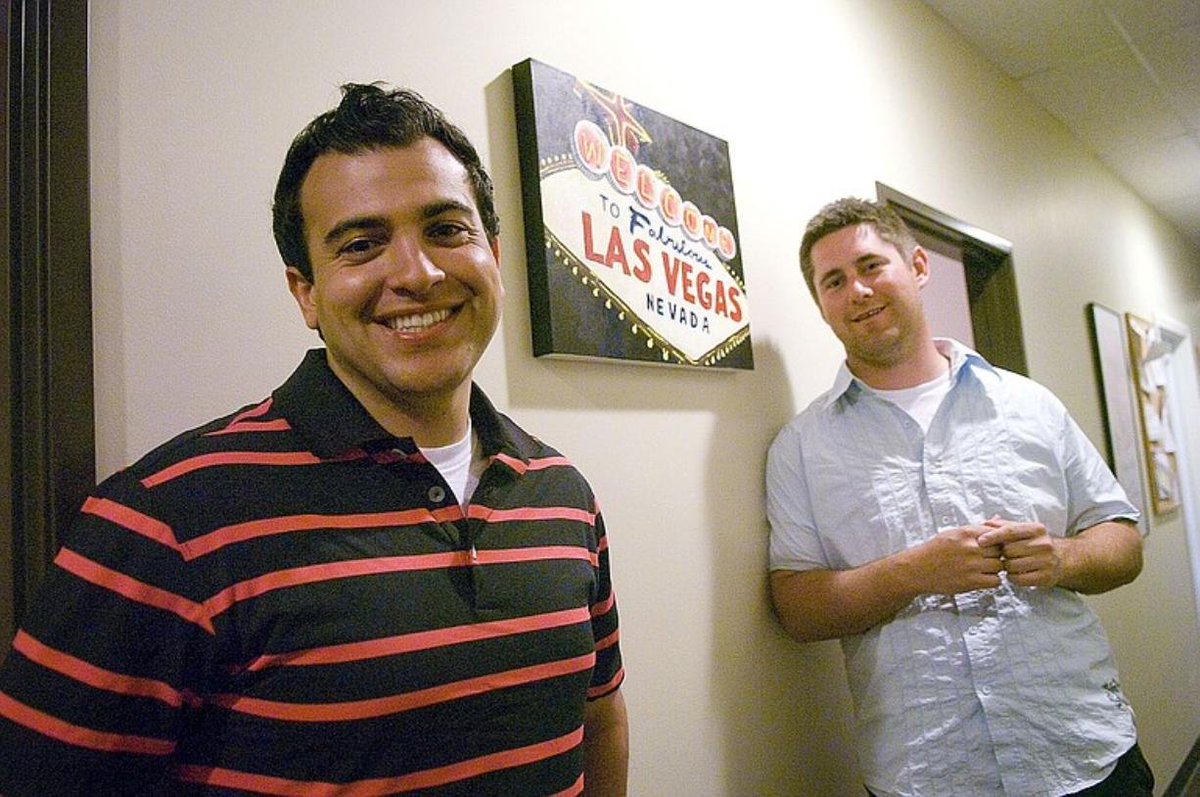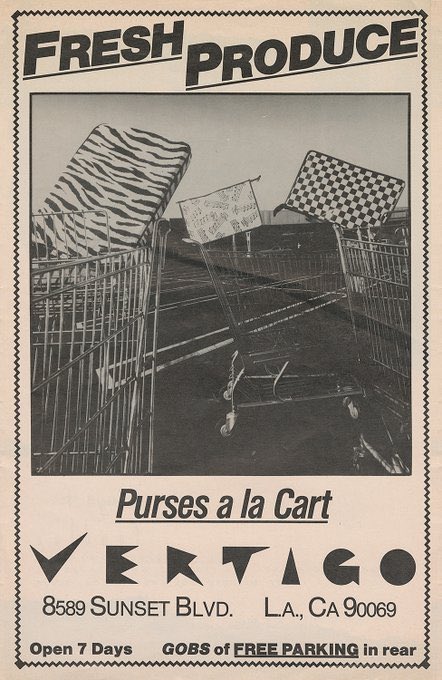
Two sales guys used cold calling and data to turn their credit card debt into a $23+ BILLION public company.
The best part?
I interviewed one of them!
This is the wild story 👇🏾👇🏾👇🏾
The best part?
I interviewed one of them!
This is the wild story 👇🏾👇🏾👇🏾
1/ Henry Schuck (@HenryLSchuck) grew up in LA, raised by a single mother, a nurse who worked three jobs to support her family
His freshman year of college he started working at iProfiles, a company that sold data lists to IT sellers.
In the dorms, he met Kirk Brown...
His freshman year of college he started working at iProfiles, a company that sold data lists to IT sellers.
In the dorms, he met Kirk Brown...

2/ He convinced Kirk to join iProfiles.
While still in college, the duo were the company's best sales people. In 2002, their sales alone doubled the company's revenues.
The lists were sold over the phone and they mailed CDs!
But the company started struggling...
While still in college, the duo were the company's best sales people. In 2002, their sales alone doubled the company's revenues.
The lists were sold over the phone and they mailed CDs!
But the company started struggling...
3/ The owner viewed it as a lifestyle business and was pulling cash out vs re-investing.
Without resources, it made everything tougher and growth slowed.
Henry tried his best to convince the owner to no avail, so after college, he headed off to Law School...
Without resources, it made everything tougher and growth slowed.
Henry tried his best to convince the owner to no avail, so after college, he headed off to Law School...
4/ In 2007, the day before his finals, Henry got a call from Kirk.
"Let's start an iProfiles competitors but use a SaaS business model"
Henry politely declined but added... "If you still want to do this in a month, call me back then, after my finals."
"Let's start an iProfiles competitors but use a SaaS business model"
Henry politely declined but added... "If you still want to do this in a month, call me back then, after my finals."
5/ Kirk called.
He convinced him to work together as 50/50 partners and DiscoverOrg was born...
To start, they spent $8k on their credit cards used to 1) hire a freelancer, 2) who aggregated data, 3) built a basic website
Henry started dialing and they made their first sale...
He convinced him to work together as 50/50 partners and DiscoverOrg was born...
To start, they spent $8k on their credit cards used to 1) hire a freelancer, 2) who aggregated data, 3) built a basic website
Henry started dialing and they made their first sale...
6/ By the end of the year, they had $110k in sales!
In 2008, they had $270k in sales. They all worked out of one house to keep costs low.
They hired 2 employees full time for data gathering. Kirk ensured the data was great. Henry sold it.
They made some unique investments..
In 2008, they had $270k in sales. They all worked out of one house to keep costs low.
They hired 2 employees full time for data gathering. Kirk ensured the data was great. Henry sold it.
They made some unique investments..
7/ DiscoverOrg remained laser-focused on top quality data for technology vendors selling into IT organizations of all sizes.
Not just phone and email...
• IT org charts
• Active projects
• Infrastructure
Everything was hand built and human-verified over the phone...
Not just phone and email...
• IT org charts
• Active projects
• Infrastructure
Everything was hand built and human-verified over the phone...
8/ By 2011, they reached $5.3MM. Still completely bootstrapped.
Their primary research was a huge differentiator:
they had 30+ employees making 100K calls every month over VOIP for data gathering. "No bad data" was their slogan.
But, In 2013, they missed their goals...
Their primary research was a huge differentiator:
they had 30+ employees making 100K calls every month over VOIP for data gathering. "No bad data" was their slogan.
But, In 2013, they missed their goals...
9/ In 2012, they 3x'd their revenue to $14m. So they set an "easy" goal of doubling in 2013
Instead, they barely grew 30%
Their costs spiked. They couldn't find more sellers. They weren't in enough verticals...
Remembering their lesson from iProfile, Henry acted quickly...
Instead, they barely grew 30%
Their costs spiked. They couldn't find more sellers. They weren't in enough verticals...
Remembering their lesson from iProfile, Henry acted quickly...
10/ He was humble enough to realize he needed investment dollars and a partner to help him go to the next level.
In June of 2014, they sold 50% of the biz for $90M.
It made them wealthy but also gave them the capital and expertise to take DiscoverOrg to the next level.
In June of 2014, they sold 50% of the biz for $90M.
It made them wealthy but also gave them the capital and expertise to take DiscoverOrg to the next level.
11/ In 2015-16, they saw ARR top $50M, they grew their database to 700k people and hired another 150 people.
But the best part: they acquired iProfile, where it all started for them.
They were on cloud9 when they faced the company's first existential crisis...
But the best part: they acquired iProfile, where it all started for them.
They were on cloud9 when they faced the company's first existential crisis...
12/ Their sales and data verification calls/emails were getting flagged as spam!
It took over 6 months and $3M to solve the problem but it actually led to several advantages:
1) email verification that created a network effect
2) platform that enabled them to do more M&A
It took over 6 months and $3M to solve the problem but it actually led to several advantages:
1) email verification that created a network effect
2) platform that enabled them to do more M&A
13/ In 2017, after consistently battling them in the market, they acquired their largest competitor: Rainking.
They paid 9 figures but were quickly able to double the combined businesses making the purchase price seem cheap.
But they were not done yet...
They paid 9 figures but were quickly able to double the combined businesses making the purchase price seem cheap.
But they were not done yet...

14/ In March 2018, The Carlyle Group invested $500M valuing them at over $2BN.
In 2019, they bought out their last competitor: ZoomInfo in a $500M+ deal.
They rebranded the whole co as ZoomInfo and it was doing $300M+ in ARR.
It was time to IPO...
In 2019, they bought out their last competitor: ZoomInfo in a $500M+ deal.
They rebranded the whole co as ZoomInfo and it was doing $300M+ in ARR.
It was time to IPO...
15/ They filed for their IPO in spring of 2020, just as COVID brought the global economy to a standstill.
Their investment bankers panicked. Their board said to pause. @HenryLSchuck was undeterred: "Let's go for it!"
They floated in June 2020 at a $13.4BN valuation... then
Their investment bankers panicked. Their board said to pause. @HenryLSchuck was undeterred: "Let's go for it!"
They floated in June 2020 at a $13.4BN valuation... then
16/ Covid became more of a tailwind.
While upsells slowed, new biz exploded.
For example, they had a tent-selling business whose events revenue went to zero build an even bigger business selling to hospital systems all using ZoomInfo data.
Wall Street quickly caught on...
While upsells slowed, new biz exploded.
For example, they had a tent-selling business whose events revenue went to zero build an even bigger business selling to hospital systems all using ZoomInfo data.
Wall Street quickly caught on...
17/ ZoomInfo has a massive addressable market, no major competitors anymore, amazing economics (89% gross margins) and network effects everywhere.
Today, they are valued at over $23BN.
Henry & Kirk are multi-billionaires (and super nice guys!)
Today, they are valued at over $23BN.
Henry & Kirk are multi-billionaires (and super nice guys!)
18/ Enjoy the legend of this Bootstrapped Giant?
Follow @jspujji for more stories about bootstrapped giants, dtc, growth marketing and entrepreneurship!
Like this one I wrote about another bootstrapped B2B empire founded by 2 tech misfits:
Follow @jspujji for more stories about bootstrapped giants, dtc, growth marketing and entrepreneurship!
Like this one I wrote about another bootstrapped B2B empire founded by 2 tech misfits:
https://twitter.com/jspujji/status/1418641736788856832?s=20
19/ Sources:
cnbc.com/2020/06/04/zoo…
bizjournals.com/portland/news/…
finsmes.com/2016/03/discov…
gzconsulting.org/2015/10/16/dis…
gzconsulting.org/2018/09/04/dis…
bizjournals.com/portland/print…
columbian.com/news/2010/jun/…
oklahoman.com/article/312560…
prweb.com/releases/2015/…
sramanamitra.com/2012/08/30/boo…
cnbc.com/2020/06/04/zoo…
bizjournals.com/portland/news/…
finsmes.com/2016/03/discov…
gzconsulting.org/2015/10/16/dis…
gzconsulting.org/2018/09/04/dis…
bizjournals.com/portland/print…
columbian.com/news/2010/jun/…
oklahoman.com/article/312560…
prweb.com/releases/2015/…
sramanamitra.com/2012/08/30/boo…
20/ This is a hilarious yet succinct summary of the ZoomInfo story by the master @kylascan
https://twitter.com/joincolossus/status/1425454518242775044?s=20
21/ Want to learn more about this $20BN Bootstrapped SaaS Unicorn, check out my 1hr+ @bizbreakdowns with founder @HenryLSchuck where we go deep on:
+ ZoomInfo M&A Strategy
+ Unique Sales Cycle Speed
+ Amazing gross margins and network effects
+ ZoomInfo M&A Strategy
+ Unique Sales Cycle Speed
+ Amazing gross margins and network effects
https://twitter.com/patrick_oshag/status/1425426692240195585?s=20
22/ Why I loved this story:
+ They bootstrapped a SaaS unicorn in the midwest!
+ Their self-awareness in scaling and finding outside help
+ They leaned on their strengths (selling) to win
+ You don't need a CS degree to build a great SaaS biz
Follow @jspujji for more stories!
+ They bootstrapped a SaaS unicorn in the midwest!
+ Their self-awareness in scaling and finding outside help
+ They leaned on their strengths (selling) to win
+ You don't need a CS degree to build a great SaaS biz
Follow @jspujji for more stories!
If you make it this far, here’s a treat. @HenryLSchuck read the thread and wrote his own!
Check it out and follow him:
Check it out and follow him:
https://twitter.com/henrylschuck/status/1425579022713565190
• • •
Missing some Tweet in this thread? You can try to
force a refresh







